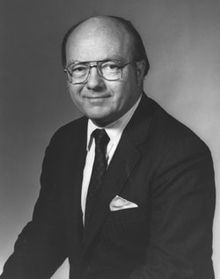Jack Matlock
Jack Foust Matlock Jr. (Born October 1, 1929 in Greensboro , North Carolina ) is an American diplomat and historian. He served as United States ambassador in Czechoslovakia , and from 1987 to 1991 in the Soviet Union .
Life
Matlock studied at Duke University , where reading Dostoyevsky sparked his interest in Russian culture. After graduating from Columbia University and working as a Russian teacher at Dartmouth College , Matlock joined the foreign service in 1956. Its first use was the embassy in Moscow from 1961 ; then he served in Africa.
In 1974 he returned to Moscow as envoy , and in 1981 as Chargé d'affaires . Reagan appointed him ambassador to Czechoslovakia and appointed him to the National Security Council in 1983 to develop a negotiating strategy to end the arms race . Negotiations and summits ( Geneva summit (1985) and summit in Reykjavík (1986) ) were resumed under Gorbachev , and Matlock was appointed ambassador to Moscow in 1987. In 1991 he retired.
After retiring from the diplomatic service, Matlock published Autopsy on an Empire about the end of the Soviet Union, followed by his description of the end of the Cold War, Reagan and Gorbachev: How the Cold War Ended . Matlock was inducted into the Institute for Advanced Study and taught diplomacy at several New England colleges . In 1998 he was accepted into the American Philosophical Society . He lives in Princeton with his wife Rebecca .
Criticism of US politics
After his departure from government offices, Matlock occasionally expressed criticism of US politics with other experts. On June 26, 1997, he was among the signatories of an open letter to Bill Clinton , in which the plans for the eastward expansion of NATO were criticized. The letter cited as reasons that the eastward expansion would divide Europe again and weaken the democratization and openness of Russia. One of the reasons he gave when he made a statement to the Senate Foreign Relations Committee was the fear that NATO expansion would lead to setbacks in nuclear disarmament and thus increase the risk of terrorist attacks with the help of nuclear weapons.
In an interview with the taz on September 10, 2014, Matlock said it was “a mistake (was) to expand NATO to the east - and the way in which it happened. We must not forget that the end of the Cold War was not a Western victory. ”He was mainly referring to the expansion to include countries like Bulgaria and Romania, which had no security interests like the Baltic states or Poland. Matlock considers Putin's policy in the Ukraine conflict to be a clearly predictable reaction to a series of provocations by the West that is understandable in view of Russia's security interests.
Web links
- JackMatlock.com website and blog
- Booknotes Interview with Matlock on Reagan and Gorbachev: How the Cold War Ended , 2004.
Individual evidence
- ↑ Hearings , United States House Committee on Foreign Affairs , 1971.
- ↑ Jack F., Jr. Matlock: Autopsy on an Empire: The American Ambassador's Account of the Collapse of the Soviet Union . Random House , 1995, ISBN 0-679-41376-6 .
- ↑ Jack F., Jr. Matlock: Reagan and Gorbachev: How the Cold War Ended . Random House , New York 2005, ISBN 0-8129-7489-1 .
- ^ Member History: Jack F. Matlock. American Philosophical Society, accessed February 2, 2019 (with biographical notes).
- ^ Opposition to NATO Expansion . In: Open Letter to President Clinton . June 26, 1997. Archived from the original on September 26, 2007. Info: The archive link was automatically inserted and has not yet been checked. Please check the original and archive link according to the instructions and then remove this notice. Retrieved October 7, 2007.
- ^ Jack F., Jr. Matlock: Testimony to the Senate Foreign Relations Committee . The Eisenhower Institute . October 30, 1997. Archived from the original on January 12, 2004. Retrieved October 7, 2007.
- ↑ Ex-US ambassador on the Ukraine crisis - "This is a family dispute"
| predecessor | Office | successor |
|---|---|---|
| Francis J. Meehan |
US Ambassador to Prague November 11, 1981-20. September 1983 |
William H. Luers |
| Arthur A. Hartman |
US Ambassador to Moscow April 6, 1987-11. August 1991 |
Robert Schwarz Strauss |
| personal data | |
|---|---|
| SURNAME | Matlock, Jack |
| ALTERNATIVE NAMES | Matlock, Jack Foust Jr. |
| BRIEF DESCRIPTION | American diplomat |
| DATE OF BIRTH | October 1, 1929 |
| PLACE OF BIRTH | Greensboro , North Carolina |
